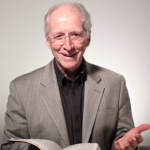“Whoever, therefore, eats the bread or drinks the cup of the Lord in an unworthy manner will be guilty concerning the body and blood of the Lord.” (1 Cor. 11:27)
In seeking to prepare for eating the Lord’s Supper worthily, men have often dreadfully harassed and tortured miserable consciences, and yet have failed to reach their goal. They have said that you must be “in a state of grace” in order to eat worthily. What does it mean to be in a state of grace? They have interpreted this to mean being pure and free from all sin. By this definition, all the men that ever have been, and all who are on the earth now, are barred from the use of this sacrament. For if we are to seek our worthiness from ourselves, it is all over with us; only despair and fatal ruin await us. Though we struggle to the utmost, we will not only make no progress, but we would only be more unworthy after we have labored most to make ourselves worthy.
To cure this ulcer, they have devised a mode of procuring worthiness: After having, as far as we can, made an examination and taken an account of all our actions, we are to be cleansed of our unworthiness by contrition, confession, and satisfaction. I say that such things, at best, give poor and fleeting comfort to alarmed and downcast consciences, struck with terror at their sins. For if the Lord admits only the righteous and innocent to partake of his Supper, every man would have to be very cautious before feeling that he had righteousness of his own which God requires.
How could we be assured that we have truly done everything in our power to discharge our duty to God? Even if we could be assured of this, who would then venture to assure himself that he, in fact, had done all that he could do? So, we would have no certain security for our worthiness, and access to the Supper would always be excluded by the fearful warning, “Whoever, therefore, eats the bread or drinks the cup of the Lord in an unworthy manner will be guilty concerning the body and blood of the Lord.” (1 Cor. 11:27)
It is now easy to judge what is the nature, and who is the author, of this kind of teaching. Certainly the devil could have no shorter method of destroying men than by thus excluding them from the taste and savor of this food which their most merciful Father in heaven is pleased to feed them. To avoid running off such a cliff, let us remember that this sacred feast is medicine to the sick, comfort to the sinner, and bounty to the poor. To the healthy, the righteous, and the rich (if any could be found) the Lord’s Supper would be of no value. For Christ is given us for food in the Supper, and we perceive that without him we fail and waste away, just as hunger destroys the vigor of the body. As he is given to us for life, so we perceive that without him we are certainly dead.
So, the best and only worthiness which we can bring to God, is to offer him our own vileness, and unworthiness, that his mercy may make us worthy:
to despond in ourselves, that we may be consoled in him
to humble ourselves, that we may be elevated by him
to accuse ourselves, that we may be justified by him
We are also to aspire to the unity which he recommends in the Supper; and, as he makes us all one in himself, we are to desire to have all one soul, one heart, one tongue.
If we ponder and meditate on these things, we may be shaken, but will never be overwhelmed by the consideration of this vital question, “How shall we, who are devoid of all good, polluted by sin, and half dead, worthily eat the body of the Lord?” We shall rather consider that we, who are poor, are coming to a benevolent giver, sick to a physician, sinful to the author of righteousness, in fine, dead to him who gives life.
The worthiness which is commanded by God, consists especially in faith, which places all things in Christ, nothing in ourselves, and in love, which, though imperfect, may be sufficient to offer to God, that he may increase it, since it cannot be fully rendered.
Some, agreeing that worthiness consists in faith and charity, have demanded a perfection of faith to which nothing can be added, and a love equivalent to that which Christ manifested towards us. And in this way, they, too, bar all men from access to this sacred feast. For, if they are correct, everyone who receives the Supper must receive unworthily, since all, are guilty of great imperfection. And certainly it is too stupid, not to say idiotic, to require, as the basis for receiving the sacrament, a perfection which would render the sacrament vain and superfluous. The Lord’s Supper was not instituted for the perfect, but for the sick and weak, to stir up, excite, stimulate, exercise the feeling of faith and love, and at the same time correct the deficiency of both.
[From Institutes of the Christian Religion, Book 4, Ch. 17, Sec. 41-42, trans. by Henry Beveridge, ed. by Jason Van Bemmel.]



